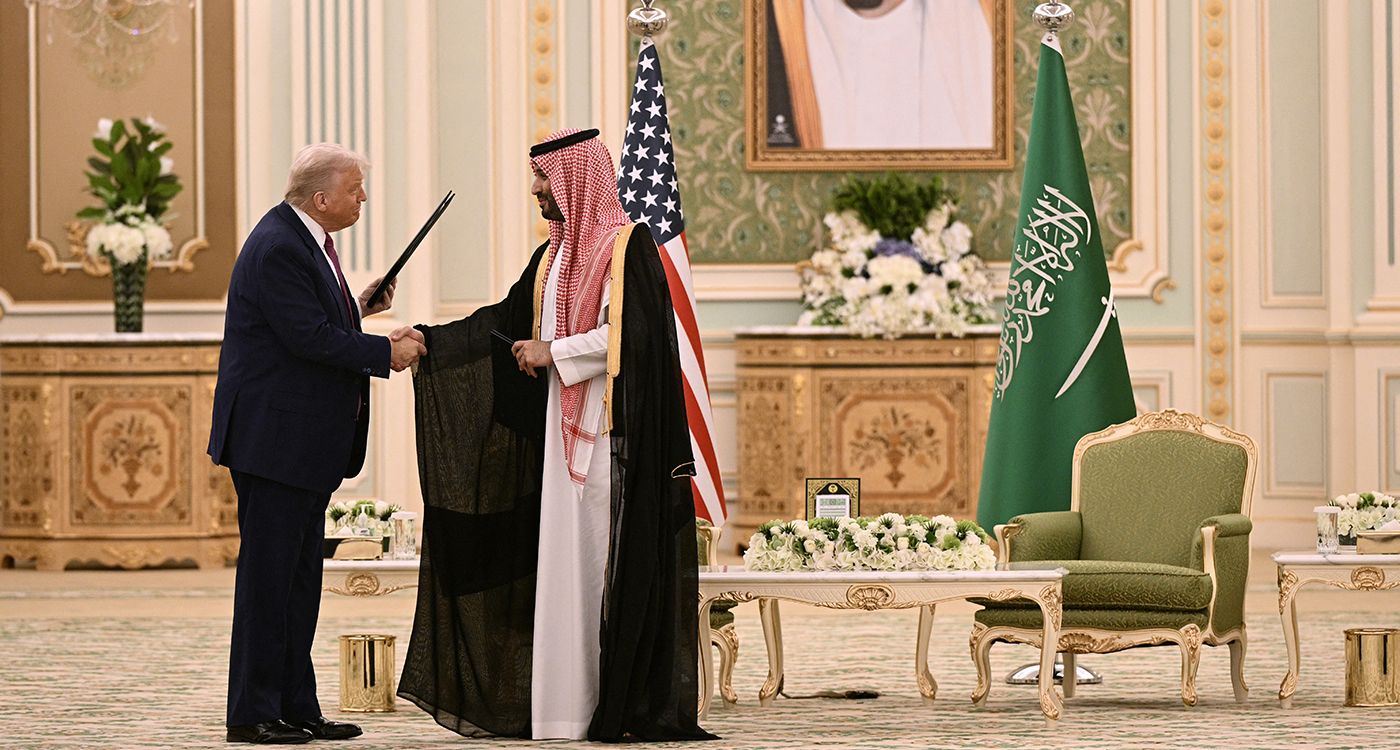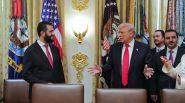- Home
- Middle East
- What Riyadh Really Expects from Trump's Visit

©Brendan SMIALOWSKI / AFP
Donald Trump is heading back to the Middle East, and this trip is anything but ceremonial. With geopolitical tensions still simmering and economic rivalries on the rise, the US president is launching a Gulf tour shaped by opulence, billion-dollar deals and behind-the-scenes diplomacy. In Saudi Arabia, his hosts want more than symbolic gestures, they're seeking firm commitments, advanced weaponry and, most importantly, a priority spot in Washington’s strategic focus.
On May 13 in Riyadh, Donald Trump kicked off a high-stakes tour of the Middle East, starting with a lavish welcome in Saudi Arabia. Escorted by Saudi F-15 fighter jets and greeted warmly by Crown Prince Mohammed bin Salman, the former real estate mogul turned president is under close scrutiny from the Kingdom. What are the Saudis really hoping to gain? More than just symbolic gestures, Riyadh is aiming for a carefully crafted mix of economic deals, geopolitical leverage and technological partnerships.
A ‘Useful’ Partner, Controversies Aside
Donald Trump is a familiar figure in Saudi Arabia. Eight years ago, during his first term, he made the Kingdom the destination of his very first foreign trip. Choosing to return now, at the outset of his second term, is no accident. It highlights the rising significance of Gulf monarchies in Washington’s strategic priorities. For Crown Prince Mohammed bin Salman, Trump is an ideal counterpart: pragmatic, deal-oriented and unburdened by the formalities of traditional diplomacy—an approach that many regimes often find appealing.
Billions at Stake: Oil, AI and Defense
This visit is squarely focused on the economy. Trump comes bearing an implicit promise of “win-win” deals, at a time when he's facing growing pressure to show that his “America First” agenda is paying off domestically. In January, Crown Prince Mohammed bin Salman committed to investing $600 billion in the US—a bold pledge Trump now wants to see expanded to $1 trillion. But the exchange is far from one-sided. In return, Riyadh is eyeing advanced weapons systems, including F-35 fighter jets, as well as exclusive access to cutting-edge American technology, particularly in the field of artificial intelligence. It’s no coincidence Trump is traveling with a delegation of top American business leaders, including Elon Musk. Major announcements are expected across defense, energy, aerospace and digital industries.
A Double-Edged Diplomacy
The Saudis aren’t just looking for contracts, they also aim to shape US diplomacy on key regional issues: Iran, the Gaza conflict, Syria and relations with Israel. Trump, who boasts of having played a role in securing the release of an American hostage in Gaza and brokering a ceasefire in Yemen, will need to clarify his intentions.
However, Riyadh has dampened American hopes for imminent normalization with Israel, insisting that peace is impossible without a Palestinian state—a red line that Trump, architect of the Abraham Accords, will need to navigate, at least publicly.
The Shadow of Family Business
Beneath this diplomatic tour lies a more unsettling reality: the Trump family's business interests in the Gulf. From the Trump Tower in Jeddah to a large real estate project in Oman, as well as golf resorts in Dubai and cryptocurrency ventures in Abu Dhabi, the Trump Organization has made significant inroads into the region. While these ventures are officially managed by his sons, there is still no clear break from the president’s personal interests.
Questions have been raised: Are the political decisions made during this tour serving only the United States, or also the Trump family's business interests? The White House has dismissed these criticisms, calling the suggestion that a president could be driven by personal business interests “ridiculous.” However, the uncertainty lingers, especially after Trump accepted—despite controversy—a Boeing 747-8 gifted by the Qatari royal family, which he plans to use after his presidency.
A Strategic Alliance, But at What Cost?
For Riyadh, the objective is straightforward: to maintain a close relationship with a US president who understands “the art of the deal.” The enormous investments in the American economy are not just friendly gestures, they are instruments of political leverage. “Catering to the Trump family's business interests could be seen as a more effective way to achieve the same goal: political influence in Washington,” explains Hassan Alhasan from the International Institute for Strategic Studies (IISS).
In short, what the Saudis expect from this visit is not just a photo on a lavender carpet or the signing of flashy contracts, but a tailored partnership where every dollar invested is aimed at strengthening a strategic, economic and... personal alliance.
Read more




Comments